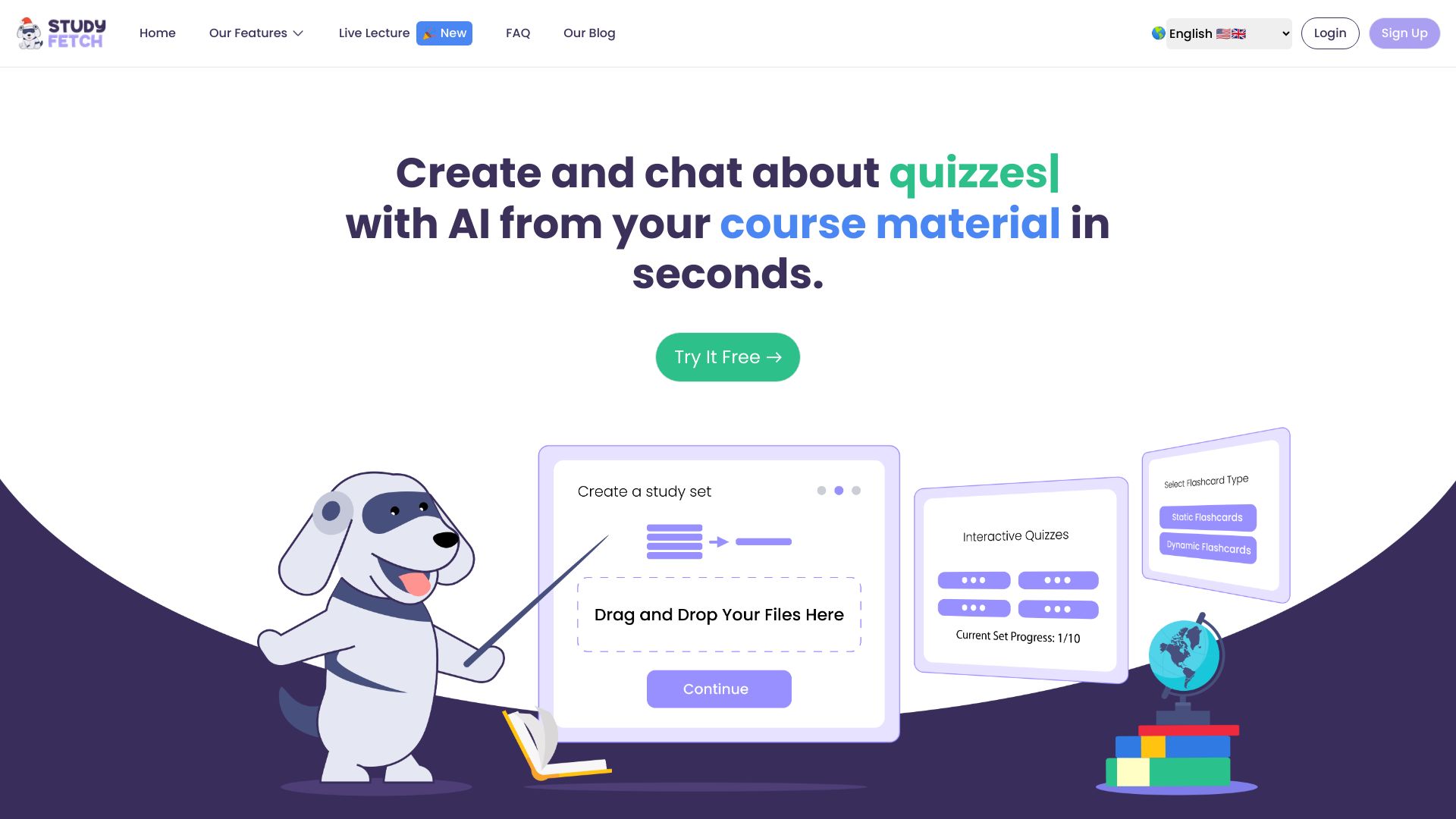- Home
- AI Summarizer
- StudyFetch

StudyFetch
Open Website-
Tool Introduction:Turn slides, lectures, and notes into AI flashcards, quizzes, and a tutor.
-
Inclusion Date:Oct 21, 2025
-
Social Media & Email:
Tool Information
What is StudyFetch AI
StudyFetch AI is an AI learning platform that turns your course materials—PowerPoints, lecture recordings, class notes, and study guides—into focused study tools in seconds. It generates AI flashcards, adaptive quizzes, concise notes, and includes an interactive AI tutor named Spark.e for on-demand explanations. With personalized feedback and progress tracking, the platform helps learners pinpoint weak areas and study more efficiently. Whether you are preparing for exams or organizing complex topics, StudyFetch AI centralizes content, surfaces key concepts, and makes revision structured, measurable, and faster.
StudyFetch AI Key Features
- AI Flashcards: Automatically converts uploaded materials into spaced-repetition flashcards that focus on key definitions, formulas, and concepts.
- Quiz Generator: Builds practice quizzes from your content, including multiple choice and short-answer formats, to reinforce learning and identify gaps.
- Notes Generation: Summarizes lectures and documents into clear, organized notes with headings and highlights for quick review.
- Spark.e AI Tutor: An interactive tutor that explains difficult topics, answers follow-up questions, and provides step-by-step reasoning from your sources.
- Personalized Feedback: Tracks performance across topics and recommends targeted practice to improve weak areas.
- Progress Tracking: Dashboards show study time, mastery levels, and quiz history for evidence-based learning.
- Multi-format Support: Works with PowerPoints, PDFs, text notes, and other study guides to streamline preparation.
- Searchable Knowledge Base: Quickly find concepts across all uploaded materials to save time and reduce context switching.
Who Is StudyFetch AI For
StudyFetch AI suits college and high school students preparing for exams, professionals studying for certifications, tutors and educators creating practice materials, and lifelong learners organizing complex subjects. It is especially helpful for courses heavy in terminology, formulas, or case-based reasoning, and for anyone who wants to transform raw class materials into structured, personalized study workflows.
How to Use StudyFetch AI
- Create an account and set up a subject or course workspace.
- Upload materials (PowerPoints, PDFs, lecture notes, or study guides) or paste text content.
- Select what you want to generate—flashcards, quizzes, or notes—and review the AI outputs.
- Use Spark.e to ask questions, request explanations, or break down complex steps drawn from your uploads.
- Practice with quizzes and flashcards; bookmark tricky items for targeted review.
- Check progress dashboards to see mastery by topic and refine your study plan.
- Iterate: upload new material, regenerate tools, and adjust based on feedback.
StudyFetch AI Industry Use Cases
In higher education, students upload lecture slides and convert them into flashcards and quizzes to prep for midterms. In test prep and certifications, candidates generate targeted question banks from official guides and use Spark.e to clarify complex scenarios. In K–12 and tutoring, educators assemble notes from class handouts and build quick practice sets for homework review. In corporate learning, teams turn internal PDFs into searchable summaries and assessment quizzes for faster onboarding.
StudyFetch AI Pricing
StudyFetch AI is commonly offered via a subscription model with plan features that may scale by usage limits (e.g., number of documents, flashcards, or AI tutor access). Availability of free trials or student discounts can change over time; refer to the official pricing page for current details.
StudyFetch AI Pros and Cons
Pros:
- Rapid conversion of course materials into flashcards, quizzes, and notes.
- Interactive AI tutor (Spark.e) for context-aware explanations.
- Personalized feedback and progress tracking support efficient study plans.
- Supports multiple file formats and centralizes scattered learning resources.
- Improves recall with spaced practice and targeted remediation.
Cons:
- Quality of outputs depends on the clarity and completeness of uploaded materials.
- May require careful review to correct occasional AI inaccuracies or oversimplifications.
- Advanced features or higher usage may be limited to paid tiers.
StudyFetch AI FAQs
-
Question 1: What types of files can I upload?
You can upload common study formats such as PowerPoints, PDFs, text notes, and study guides. Content is then processed to generate flashcards, quizzes, and notes.
-
Question 2: How does Spark.e use my materials?
Spark.e references your uploaded content to provide explanations and step-by-step answers, keeping responses aligned with your course context.
-
Question 3: Can I edit the generated flashcards and quizzes?
Yes. You can review, edit, and reorganize outputs to match your syllabus and preferred study style.
-
Question 4: Does it support spaced repetition?
Flashcards are optimized for repeated review, helping reinforce memory over time and prioritize challenging items.
-
Question 5: How is progress tracked?
Dashboards summarize study activity, quiz performance, and topic mastery so you can focus on weak areas.
-
Question 6: Is my data secure?
Your uploads are used to create study tools and tutoring context. Check the official documentation for details on data handling and privacy controls.




